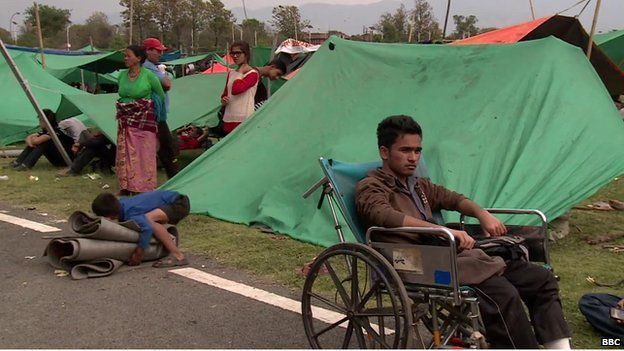Nepal earthquake: Survivors left homeless and hungry
- Published

At one of the temporary camps in Kathmandu's Lainchaur area, several men are hard at work. They are laying bricks and wooden shafts on the ground right below the large tent that is now housing about 30 people.
"We're just trying to get some more protection from the rain," says one of them.
This camp had been set up on a playground and even now there are quite a few children playing. But it no longer resembles a safe place. There's rubbish everywhere, paper plates, wrappers and plastic glasses are strewn all over.
"It's getting quite bad," says one man who is here with his wife and four daughters. "We've been here for three days and we've been living on instant noodles. There's nothing else to eat."
His house is not badly damaged, but he is adamant that he will not go home despite the challenging conditions in the camp.
"We've heard all these rumours about more earthquakes and aftershocks. We will not leave this place, not for a while."
At one end, volunteers are setting up a table. They're a local Nepalese group focusing on getting aid to those who need it.
Ask anyone - the government, the volunteers or the survivors what they need the most and you get a simple answer: "Water."
Drinking water supplies are running low and the authorities are very concerned that if it isn't addressed soon it could lead to diseases breaking out, which would only exacerbate an already difficult situation.
At Kathmandu's Bir hospital, the shiny new trauma centre - a brand new gift from neighbour India - is overflowing.
Every bed is filled and the road outside is being used as a makeshift emergency room, with patients lying on mattresses and blankets. Aid workers mingle with the hospital medical staff, assessing the situation.
"There's an urgent need for crutches, stretchers and other medical supplies especially in the outlying districts," says Sarah Blin, country director of Handicap International.
"Cargo planes are coming in, there is material coming in including medical tents and other supplies."
But most of the aid material is coming into the capital and the areas just around it.
"There's an urgent need to get it out into the remote areas, where conditions are far worse," says Ms Blin.
At the other end of the hospital, behind the old wing, soldiers wearing face masks perform a grim task. A pick-up truck carrying a body has just arrived. It is covered in dirt.
"We found this body in the Darbar Square under a destroyed temple," says one of the soldiers.
They carry it into the hospital and place it along with a few other bodies outside the morgue, in the open. There's no space inside.
A few people shuffle past them, faces covered with handkerchiefs because of the stench, trying to identify the victims.
It is distressing sight. But every now and then the rescue workers have reason to hope.
"While we were digging out this body, we found a man trapped inside who we've pulled out," says the soldier. "We are taking an oxygen cylinder out to him now. He's going to survive."